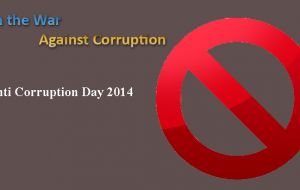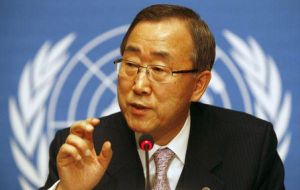MercoPress. South Atlantic News Agency
United Nations urges “the dismantling of corruption's high walls”
 The 2014 International Day theme, Breaking the Corruption Chain, is geared to in tackle a phenomenon “that strikes hardest at the poor”
The 2014 International Day theme, Breaking the Corruption Chain, is geared to in tackle a phenomenon “that strikes hardest at the poor”  “To dismantle corruption's high walls, I urge every nation to ratify and implement the UN Convention against Corruption,” said Mr. Ban
“To dismantle corruption's high walls, I urge every nation to ratify and implement the UN Convention against Corruption,” said Mr. Ban The fight against corruption is a global concern requiring the broadest possible response to “dismantle its high walls”, United Nations Secretary General Ban Ki-moon said on Tuesday, 9 December, in a message marking International Anti-Corruption Day (*).
“To dismantle corruption's high walls, I urge every nation to ratify and implement the UN Convention against Corruption,” said Mr. Ban, underscoring that while the treaty's ground breaking measures in the areas of prevention, criminalization, international cooperation and asset recovery have made important inroads, “there is much more to do.”
The theme of the 2014 International Day, Breaking the Corruption Chain, is geared towards showing the importance of individual engagement in tackling a phenomenon “that strikes hardest at the poor, hinders inclusive economic growth and robs essential services of badly needed funds.”
“From cradle to grave, millions are touched by corruption's shadow,” the Secretary-General said, urging engagement of the public and private sectors. Public servants and elected officials had to be guided by ethics, transparency and accountability, while the private sector needed to recognize that good behavior is good business.
Looking ahead to agreement on a new post-2015 sustainable development agenda, Mr. Ban emphasized how the new agenda would promote better practices.
“Our aim is to empower individuals and catalyze Governments, the private sector and civil society to help lift millions out of poverty, protect the planet and achieve shared prosperity and dignity for all,” he said, adding that “eliminating corruption and its harmful impacts will be crucial to our future well-being.”
Yury Fedotov, Executive Director of the UN Office on Drugs and Crime, also remarked on the campaign, calling on everyone to mark the International Day with events, to use the Call to Action Matrix, and to spread the word through social media.
Outlining corruption's reach into “boardrooms, government, law enforcement, education, healthcare and sport”, among other areas, he stressed the practices destructive effects, especially on the poor.
“Corruption, today, represents a serious brake on the forward motion of sustainable development and building effective institutions,” said Mr. Fedotov, adding that corruption “oils the wheels of other damaging crimes, including illicit trafficking in drugs, people, animals, timber and guns.”
Echoing the Secretary-General, he said that global resistance to corruption hinged on worldwide ratification and implementation of the UN anti-corruption convention, together with participation in the treaty's peer review mechanism, and he pointed to the tools' transformational effects.
“These range from meaningful reform to the strengthening of anti-corruption institutions all over the world,” he said.
Looking ahead to next year's Sixth Conference of the States Parties to Convention, which will be held in St. Petersburg, Russia, Mr. Fedotov said the meeting would offer “an opportunity to further strengthen global anti-corruption action and deliver the message that corruption has no place in our world.”
The Convention was originally adopted by the UN General Assembly in 2003, with 9 December designated International Anti-Corruption Day to raise awareness of corruption and the treaty's role in combating and preventing the scourge.
(*) In its resolution 55/61 of 4 December 2000, the General Assembly recognized that an effective international legal instrument against corruption, independent of the United Nations Convention against Transnational Organized Crime (resolution 55/25, annex I) was desirable and decided to establish an ad hoc committee for the negotiation of such an instrument in Vienna at the headquarters of the United Nations Office on Drugs and Crime.
The text of the United Nations Convention against Corruption was negotiated during seven sessions of the Ad Hoc Committee for the Negotiation of the Convention against Corruption, held between 21 January 2002 and 1 October 2003.
The Convention approved by the Ad Hoc Committee was adopted by the General Assembly by resolution 58/4 of 31 October 2003. The General Assembly, in its resolution 57/169 of 18 December 2002, accepted the offer of the Government of Mexico to host a high-level political signing conference in Merida for the purpose of signing the United Nations Convention against Corruption.
In accordance with article 68 (1) of resolution 58/4, the United Nations Convention against Corruption entered into force on 14 December 2005. A Conference of the States Parties is established to review implementation and facilitate activities required by the Convention.




Top Comments
Disclaimer & comment rules-

-

-

Read all commentsGlobal Corruption Index scores: UK 14th place, Chile and Uruguay joint 21st and Argentina 107th place. One-hundred-and-seventh place. Still, I suppose the Argentinean politicians will keep on spinning the 'great Malvinas myth' to distract the populous away from corruption.
Dec 10th, 2014 - 09:24 am 0Removing all politicians wont solve the problem,
Dec 10th, 2014 - 12:00 pm 0But,
it will go a long way to help it .
lolol
Perhaps it would be an idea if the UN were to stamp out its own internal corruption. The C-24 currently has 29 members. But there are only 17 non self-governing territories! How many of those 29 members have poor human rights records? At least 17. How many are members of the argie clique? 7. Has the C-24 ever told non self-governing territories what they need to do to get themselves removed from the list? Why has Ecuador provided the chair of the C-24 on three consecutive occasions? Why aren't countries such as Australia, Canada, New Zealand, Netherlands, Switzerland members of the C-24?
Dec 10th, 2014 - 12:12 pm 0Commenting for this story is now closed.
If you have a Facebook account, become a fan and comment on our Facebook Page!